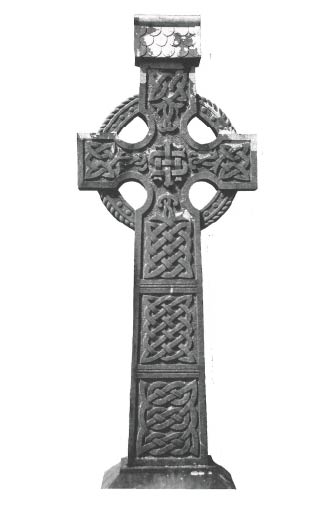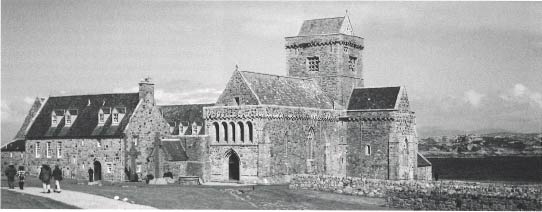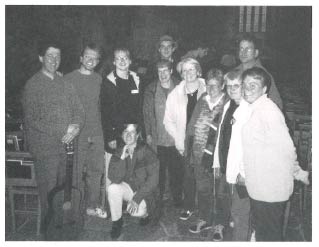Updated March, 2025
John Bell has been avoiding me.
In the past few years, I’ve been increasingly nurtured by the music the Iona Community produces and distributes. But for most of that time, the hope that I would ever encounter Bell, perhaps its best-known member, had been diminishing.
When I lived in Edmonton, I noticed Bell was speaking in Grand Rapids. By the time I packed up my belongings and moved to Grand Rapids to attend Calvin Seminary, Bell promptly shared his gifts in Edmonton. Finally, in a last-ditch effort, I made the pilgrimage all the way to the tiny island of Iona off the coast of Scotland. But he wasn’t there either.
I finally caught up with Bell in July 2001 at COLAM in Wheaton, Illinois. But this meeting didn’t exactly fulfill my dreams. For by then I had learned a valuable lesson: to understand the mission and music of the Iona Community I couldn’t simply pursue John Bell. Simply put, the community does not revolve around him.
In their own words, the life of the community revolves around integrating work and worship, prayer and politics, the sacred and the secular. Bell and many others in the community would be the first to make that clear. In fact, he and the other 240 members of the community are keen to engage in the difficult task of finding new ways of living out the gospel in the world.
What Is Iona, Anyway?

When I visited the Iona Community with members of the youth group of West End Christian Reformed Church, Edmonton, Alberta, one of the first things we had to ask was, Just what is the Iona Community? Jan Sutch Pickard, Assistant Warden at Iona at the time, explained that there are three ways of using the word Iona.
- First, Iona is a tiny island off the west coast of Scotland, so small it hardly qualifies for inclusion on many maps. Approximately two hundred people reside there, many of whom have nothing to do with the community we were visiting. The Ionians live a simple village life—raising sheep, running the local shops, and breathing in the island’s magnificent beauty.
- Second, Iona is the name of the Christian community located on the island, begun by Rev. George MacLeod in 1938 during the Depression. MacLoed, a Church of Scotland minister, was alert to the fact that the church was neglecting the unemployed poor. He was granted permission to take a handful of men to the island to rebuild the ruins of a thousand-year-old Abbey church. That rebuilding became a metaphor for the rebuilding of the common life, a return to the belief that daily activity is the stuff of godly service—work and worship. The community has continued to this day, though it has become more broadly ecumenical in intention and membership.
- Finally, Iona represents the members of the community. For the most part, the members do not reside on the island. About 95 percent of them live in the United Kingdom, many of these working and worshiping in the poorest parts of Glasgow. The other 5 percent are scattered around the world in places ranging from North America to Uganda.
A Weekly Rhythm
One of the most appreciable aspects of our weeklong visit was our experience of that blending of work and worship (that and the scenery!). Days began and ended with worship, framing whatever else we enjoyed or accomplished. And each day of the week’s worship highlighted a particular theme. These themes constitute the community’s daily rhythm—for members who live on the island or elsewhere.
Sunday
Our first full day there was Sunday. The theme, appropriately, was “welcome.” The community welcomed us just as it gladly welcomes all people—regardless of their history, intended destinations, economic status, marital status, age, gender, ethnicity, or sexual orientation. One of my Edmonton friends described this as an “ecumenical camaraderie.”
As guests, we too were encouraged to be welcoming—to each other. In this way we communally reflected the hospitality of the triune God, who graciously makes space for sinners in God’s growing kingdom. In light of this, Sunday morning’s liturgy had us singing Marty Haugen’s “All are Welcome” (Iona’s hospitable spirit ensures that it makes plenty of room for songs besides its own!).
Monday
Monday’s work and worship highlighted the themes of justice and peace. In the cries of the voiceless—the abused, the poor, the persecuted—the Iona Community hears the cries of the suffering Christ. These twin themes are, in fact, what motivate the community’s members to a whole host of worldly involvements. For example, on our visit, a letter circulated addressing Nestle regarding its practice in some developing nations of advancing its own products at the expense of the healthy mother’s milk that would better benefit many babies. The issues of justice and peace prod the community (and us) to uncomfortably blend prayer and politics. In our worship, we sang the song “Don’t Tell Me of a Faith That Fears,” from their collection Love and Anger.
Tuesday
The theme of healing shaped Tuesday. The community recognizes in its daily liturgy that there is a profound sense in which all people need healing. As we stand before our Maker, we become pointedly aware of how far removed we are from being what we were really created to be. At the same time, the community sees the need to intercede and work for healing in more particular ways. Our evening liturgy made space for such prayers and for the laying on of hands for people who were present or elsewhere. The song “We Cannot Measure How You Heal” (see p. 36) allows worshipers to express both the multitude of ways in which people hurt and the mysterious means by which God often heals.
Wednesday
Wednesday’s theme of pilgrimage is a potentially dangerous one for Iona. On the one hand, the community is conscious of its attraction for pilgrims, and it encourages people to make physical journeys to and around Iona in order to satisfy their thirst for God. On the other hand, Iona knows of pilgrims who have placed all their hopes in reaching that tiny island. Such people are often disappointed. After all, there is nothing magic about Iona. Neither walking to Columba’s Bay on the southern tip nor spending a quiet moment in the nearby Nunnery ruins will guarantee salvation for the troubled pilgrim.
Rather, the Iona Community intends to point travelers to Jesus Christ, who is the Way. This view of pilgrimage lies behind an Iona Lenten journey song, “Travelling the Road to Freedom” (in The Courage to Say No) of which the final stanza represents Jesus’ voice:
Travelling the road to freedom,
I am the Way, I’ll take you there.
Thursday
Thursdays at Iona accentuate the theme of commitment. The community knows full well that the pattern of gospel living requires deep commitment. In order to foster this, Iona promotes the use of every individual’s gifts, believing that God equips each person for service in unique and important ways. In our evening service, worshipers were encouraged to visit different stations in the Abbey and make actions of commitment with respect to body, mind, or heart. As we did so, we both entrusted ourselves to and admitted our dependence upon God as we repeatedly sang the prayer song “Take, O Take Me As I Am” (in Come All You People and Sing! A New Creation).
Friday
In the midst of its serious commitment to work and worship, Iona knows how to celebrate before God. Our group experienced a foretaste of this at the Ceilidh (pronounced kay-lee) we attended, a local bash with late-night fiddling and dancing. The community embodies this traditional Scottish spirit on Fridays—a sort of kingdom-party TGIF. And Iona continues the intention and revelry of Ceilidhs as it gathers and distributes music from around the world. For example, we processed into worship one evening singing “Come, All You People,” a festive Zimbabwean gathering song that naturally invites movement (Sing! A New Creation).
Saturday
Saturday’s theme, mission, explains why so few of the Iona Community’s members live on the island. As much as Iona may be a sanctuary for some, it is crucial to the community that it be even more a place of sending forth. God calls us to follow the ascended Christ into the world, to the joyful, challenging task of witnessing to the ends of the earth. Fittingly, the traditional Celtic symbol for the Holy Spirit is a wild goose, and the community has adopted this symbol as its publishing name. There is a certain headlong abandonment to following the Spirit’s countercultural leading. Regarding members’ places of residence and service, one member of Iona said to me: “If people remain at Iona [the island] too long, we try to kick them off.” Christ calls, and the community responds. This theme is expressed in the Iona song “The Summons” (see p. 39).

Living Out the Gospel

Bell was so unassuming at COLAM last July that it was hard to find him. There’s something instructive about that, I think. John Bell’s goal isn’t to have the world hear about John Bell, but rather to enable honest and participative worship. Similarly, the Iona Community exists not “to build an empire,” as Bell put it, but to thrust the gospel into every area of society. It’s not surprising that the community’s theological leaning has been described as “strongly incarnational.”
At COLAM, Bell spoke in the context of the Psalms about how Christians’ experience needs to be shaped by and to express the full breadth and depth of Scripture—joy and lament, ups and downs, Psalm 100 and Psalm 130. This is the lesson we can learn from the Iona Community—to find new ways of living out the gospel in the world. The whole gospel in the whole world. The relationship between the community’s mission and worship is a reminder of the connection we should all should strive for—the bustling intersection of work and worship, of prayer and politics, of sacred and secular.

